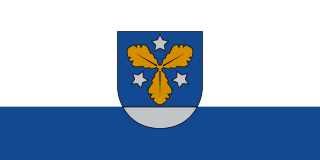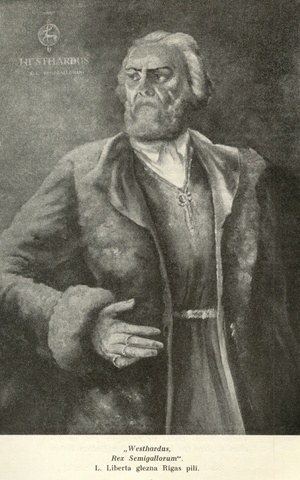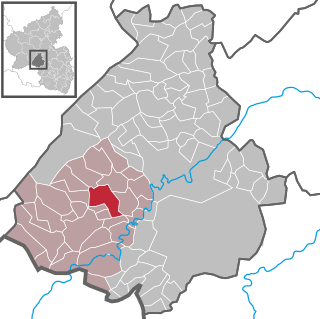Related Research Articles

Year 1279 A.D (MCCLXXIX) was a common year starting on Sunday of the Julian calendar.

William I, or Wilhelm I, was King of Prussia from 1861 and German Emperor from 1871 until his death in 1888. A member of the House of Hohenzollern, he was the first head of state of a united Germany. He was de facto head of state of Prussia from 1858, when he became regent for his brother Frederick William IV. During the reign of his grandson Wilhelm II, he was known as Wilhelm the Great.
The Livonian Brothers of the Sword was a Catholic military order established in 1202 during the Livonian Crusade by Albert, the third bishop of Riga. Pope Innocent III sanctioned the establishment in 1204 for the second time. The membership of the crusading order comprised warrior monks, mostly from northern Germany, who fought Baltic and Finnic polytheists in the area of modern-day Estonia, Latvia and Lithuania. Alternative names of the Order include Christ Knights, Swordbrothers, Sword Brethren, Order of the Brothers of the Sword, and The Militia of Christ of Livonia. The seal reads: +MAGISTRI ETFRM MILICIE CRI (Christi) DE LIVONIA.

Ferdinand I was Emperor of Austria from March 1835 until his abdication in December 1848. He was also King of Hungary, Croatia and Bohemia, King of Lombardy–Venetia and holder of many other lesser titles. Due to his passive but well-intentioned character, he gained the sobriquet The Benign or The Benevolent.

George I was King of Greece from 30 March 1863 until his assassination in 1913.

Emperor of the French was the title of the monarch and supreme ruler of the First and the Second French Empires.

Semigallians were the Baltic tribe that lived in the south central part of contemporary Latvia and northern Lithuania. They are noted for their long resistance (1219–1290) against the German crusaders and Teutonic Knights during the Northern Crusades. Semigallians had close linguistic and cultural ties with Samogitians.

Aizkraukle is a town in the Vidzeme region in Latvia, which is the administrative centre of Aizkraukle Municipality on the right bank of the Daugava River. The population in 2020 was at 7,018.

Viestards was one of the greatest Semigallian dukes in the 13th century, referred to as King Vester.

The Livonian crusade consists of the various military Christianisation campaigns in medieval Livonia – modern Latvia and Estonia – during the Papal-sanctioned Northern Crusades in the 12–13th century. The Livonian crusade was conducted mostly by the Holy Roman Empire and the Kingdom of Denmark. It ended with the creation of Terra Mariana and the Danish duchy of Estonia. The lands on the eastern shores of the Baltic Sea were one of the last parts of Europe to be Christianised. The available information is largely based on Livonian Chronicle of Henry.

Niederhambach is an Ortsgemeinde – a municipality belonging to a Verbandsgemeinde, a kind of collective municipality – in the Birkenfeld district in Rhineland-Palatinate, Germany. It belongs to the Verbandsgemeinde of Birkenfeld, whose seat is in the like-named town.

Burbach is a municipality in the Siegen-Wittgenstein district, in North Rhine-Westphalia, Germany.

Ernst Wilhelm Eduard von Knorr was a German admiral of the Kaiserliche Marine who helped establish the German colonial empire.

Aizkraukle Castle is a ruined medieval castle, located on the right bank of the river Daugava in Latvia to the west of the modern town of Aizkraukle. The castle was built in the second half of the 14th century by the Livonian Order. From 1334 to 1480 it was the seat of a Komtur.

Aizkraukle Municipality is a municipality in Vidzeme, Latvia. The municipality was formed in 2001 by merging town Aizkraukle and Aizkraukle Parish the administrative centre being Aizkraukle. The population in 2020 was 8,024.

Paul Marquart is a Minnesota politician serving as state commissioner for the Department of Revenue. A former member of the Minnesota House of Representatives, he represented District 4B, which included parts of Becker, Clay, and Norman counties in the northwestern part of the state. He is also a teacher.

Arthur Adolf, Count of Posadowsky-Wehner, Baron of Postelwitz was a German conservative statesman. He served as the secretary for the Treasury (1893–1897), secretary of the Interior, vice-chancellor of the German Empire and Prussian minister of State (1897–1907).
Ernst von Ratzeburg or Rassburg was a member of the Livonian Order. He acted as its Master from 1273 until his death at the Battle of Aizkraukle in 1279, at which he was one of 71 members of the Order to die.
Johannes Anton Marquart was a German actuarial and insurance mathematician. During World War II, Marquart was employed into the Germany Army Inspectorate 7/VI, in 1940, which later became the General der Nachrichtenaufklärung. He eventually became head of Referat Ia of Group IV of the organization in November 1944 engaged in research into German Army hand cryptographic systems. Prior to that period Marquart had been chief cryptanalysis in KONA 5.

Volkmar Klein is a German politician of the Christian Democratic Union (CDU). He is a member of the German Bundestag since 2009 and was a member of the Landtag of North Rhine-Westphalia from 1995 until 2009.
References
- Fenske, Lutz; Militzer, Klaus (1993). Ritterbrüder im livländischen Zweig des Deutschen Ordens . Retrieved 5 January 2022.
- Benninghoven, Friedrich (1965). Der Orden der Schwertbrüder. Fratres Milicie Christi de Livonia. OCLC 1547012 . Retrieved 5 January 2023.